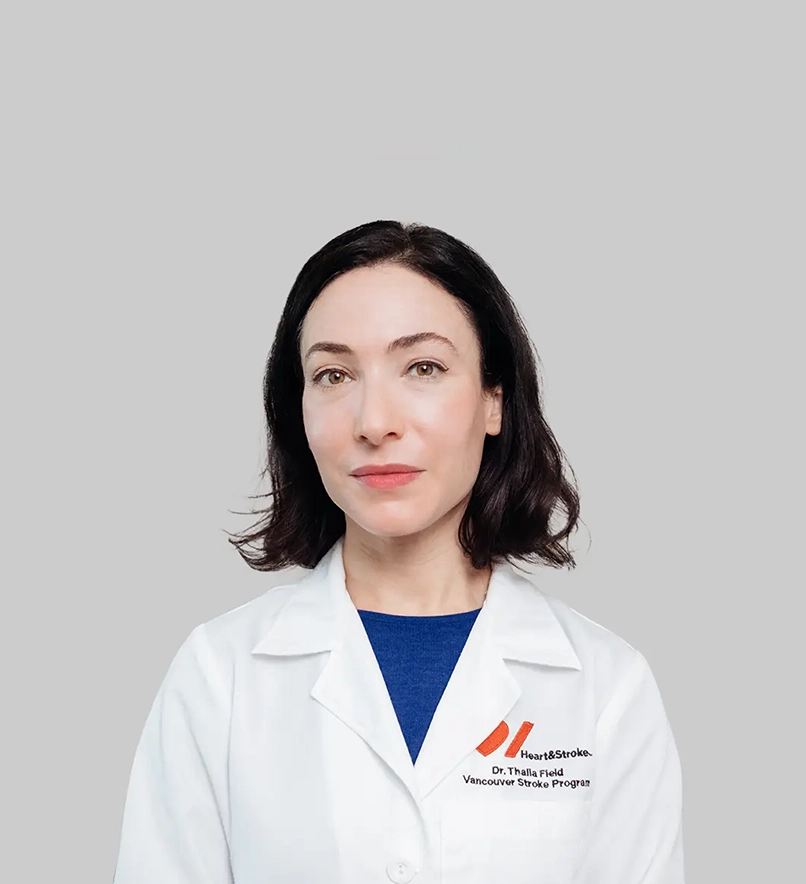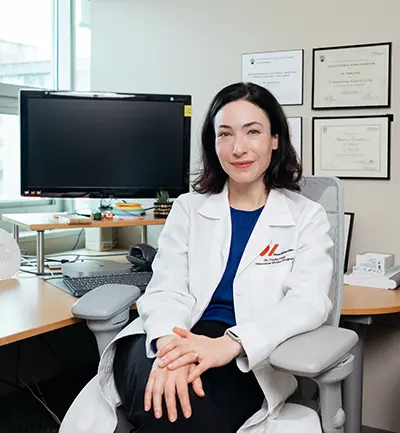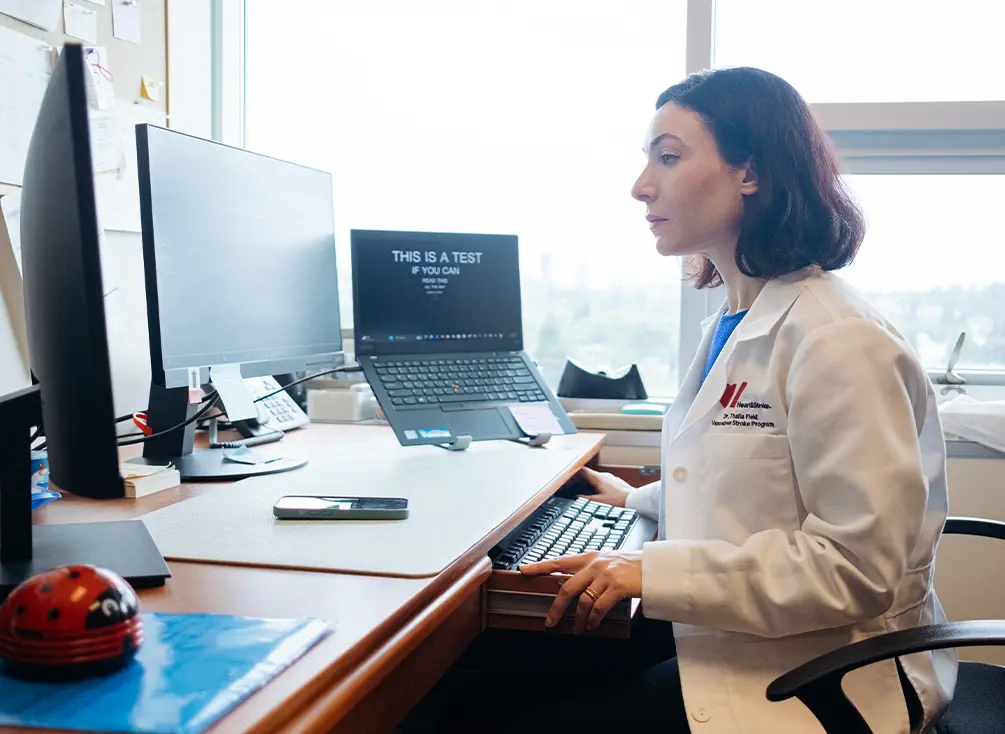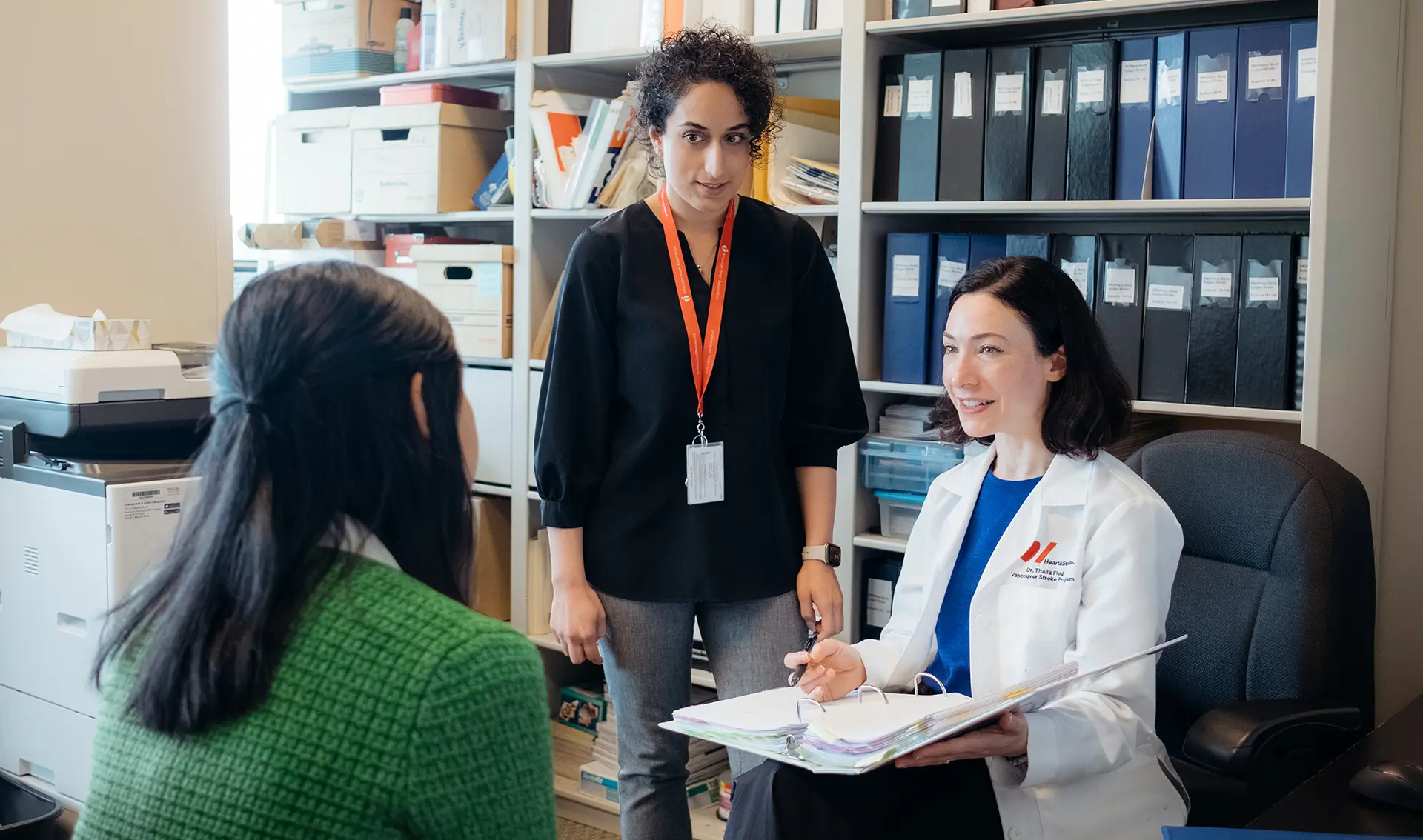
How can a heart defect impact brain health?
The effects of congenital heart disease on the brain are not well understood. Dr. Thalia Field wants to change that.
Chapter 1 The heart-brain connection
Dr. Thalia Field is a stroke neurologist. She has spent her career focused on brain health — preventing stroke, treating it and helping her patients make the best possible recovery after a stroke.
So why is Dr. Field leading a major research study on people born with a heart defect?
The condition is called congenital heart disease (CHD), and Dr. Field admits she did not encounter CHD that often earlier in her career — except for one specific defect: a hole in the heart that can trigger strokes in otherwise healthy young adults.
“Adult stroke neurologists have had a very narrow focus when it comes to congenital heart disease,” she says.
That changed for her, thanks to a colleague who treats children with stroke and was seeing many patients with CHD. He suggested that research was needed to explore how CHD might affect a person’s risk of stroke over time.
“I thought, gee, this is not on our radar,” Dr. Field says. And she wondered why, given that CHD is a rapidly growing area of adult chronic cardiology. That growth is largely due to dramatic improvements in diagnosis, surgery and care in recent decades, which means nine out of 10 children born with heart defects now survive to adulthood and beyond.
Chapter 2 Sex and gender under the microscope
Field saw an intriguing research opportunity to look at the brain health in people with CHD. As a professor of medicine at the University of British Columbia and holder of the Sauder Family/Heart & Stroke Foundation Chair in Stroke Research, she could not resist.

Dr. Thalia Field a professor of medicine at the University of British Columbia and holder of the Sauder Family/Heart & Stroke Foundation Chair in Stroke Research.

Events such as pregnancy and menopause in women with CHD could affect their brain health. But how? Dr. Field is finding out.
Dr. Field is now leading a multidisciplinary team in a study called Lifespan Brain Health Trajectories in Congenital Heart Disease: the Role of Sex and Gender. The project was recently awarded one of three Congenital Heart Disease Team Grants, co-funded by Heart & Stroke donors, together with Brain Canada and the Canadian Institutes of Health Research.
The goal is to create a map of factors that influence brain health — both risks and protective factors — throughout the lifespan of a person with CHD. The researchers want to understand how these may differ between men and women.
“We're taking the sex and gender perspective broadly,” she explains. “We're putting that lens on this lifespan trajectory of how risk and resilience manifests in congenital heart disease over the life course.”
The study has three parts:
First, the researchers will gather data from existing research, putting it together to look for patterns. “There have been lots of small cross-sectional brain imaging studies of people with different heart defects and ages from around the country and around the world,” Dr. Field says. “So, we're leveraging that data. We have different people from different age groups over time, and we have certain numbers of men and women, so what are the differences if we just lay it all out and use it as an estimate of the lifespan?”
Second, the team will recontact older children born with specific heart defects who had images of their brains taken earlier in life when they were infants. The children will undergo cognitive, psychological and neurological assessments and detailed medical histories. Repeat images will show how their brains have changed over time and whether there may be sex-related differences.
Third, the researchers will apply complexity analysis techniques to the data they have gathered. “The nature and directionality of health- related and environmental factors that may impact brain health in CHD over the lifespan is complicated. Factors may differ between men and women due to biological events like pregnancy and menopause in addition to social roles. We will use an analytical technique that explores interconnections between different factors to identify the best targets for future treatments,” says Dr. Field.
Chapter 3 Guided by patients
The study could help join the dots between factors that have never been connected before. And while Dr. Field was initially drawn by the opportunity to better understand stroke risk in people with CHD, she’s excited to shed light on much more, including brain development and impacts on cognition.
“We now have this unique opportunity to follow people with CHD as they age, to find out what risks are accumulated in early life and what risks may be accumulating over time, in whom, and how that affects how we can apply preventive strategies,” she says. “We will also learn how disparities in brain health that we see between men and women without CHD may apply to this group of individuals.”
Pulling this together requires a research team that spans disciplines — a unique aspect of this study, Dr. Field says. “I get the benefit of so much expertise from colleagues who are neonatologists, cardiologists, psychologists, psychiatrists, occupational therapists, radiologists and neuroimaging specialists. There are just so many great perspectives we can work with to appreciate the complexity of this disease.”

Dr. Field’s multi-disciplinary team brings vital perspectives to solve the CHD puzzle.
She’s particularly excited about the potential for new learning around the impacts of sex and gender. For example, previous research by Marie Brossard-Racine of McGill University, who’s part of the team for the new study, showed differences in blood flow to the brain between young men and young women with CHD. “Now we have to tease out the reasons for those differences,” Dr. Field says. “I think there’s a lot that we just don’t know yet.”
Throughout the study, Dr. Field and her team will be listening to the people who live with CHD. She stresses the importance of speaking to patients, to know what their priorities are and how we should feed this back to healthcare providers and clinicians. “It's important to bring the knowledge back to patients so that they can be empowered with the information to advocate for their health and to know what's coming.”
- See how your donation will save lives
- Learn more about recovering from heart disease

Related stories

Surgery that helps move beyond survival
Dr. Luc Mertens helps patients born with complex heart defects to live better, for longer

Strength runs in the family
Sophie Bessette’s daughter inherited her heart condition — and her fierce determination to live without limits

Saving baby Nora
Thanks to a heart transplant at five months, she’s beating congenital heart disease.
